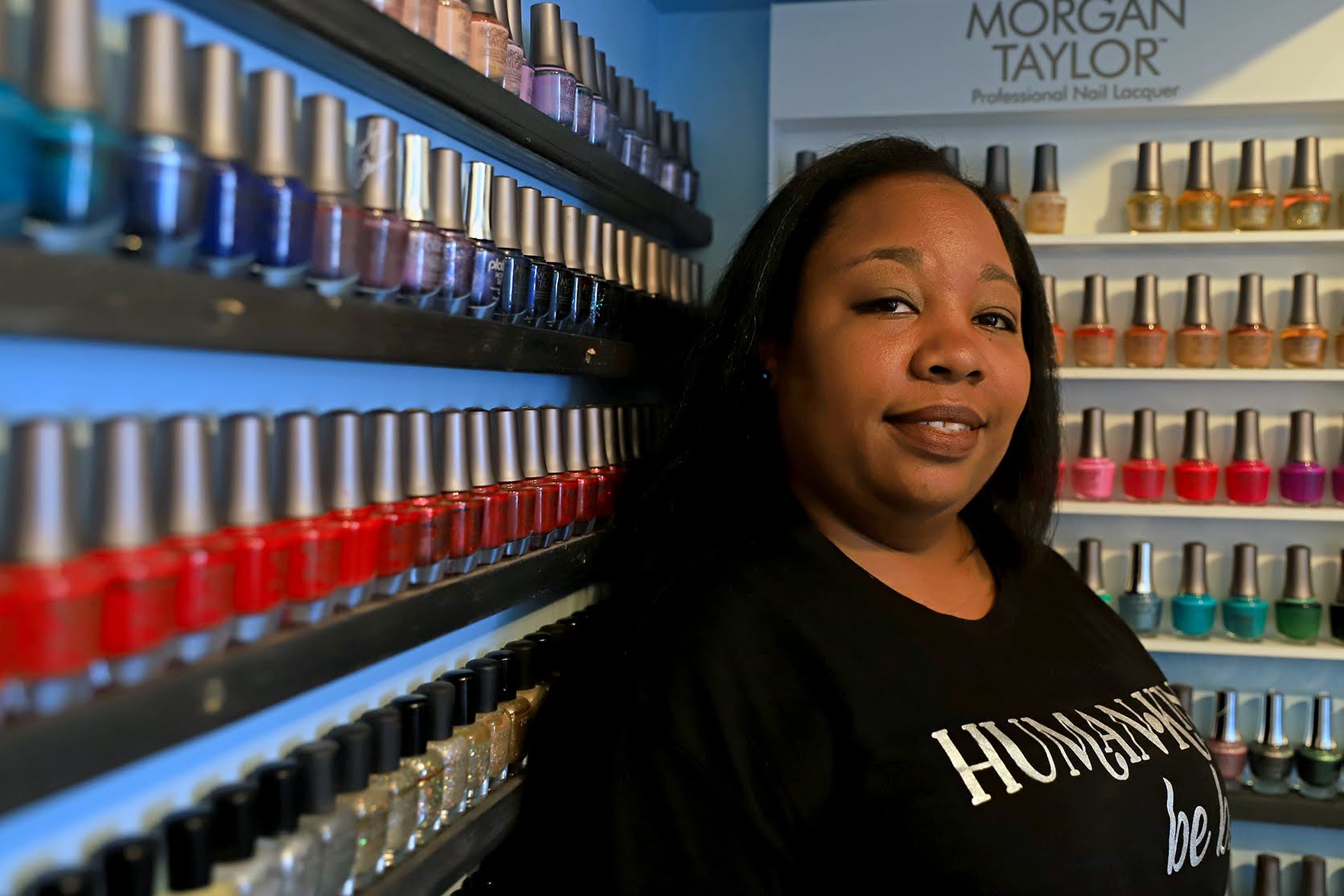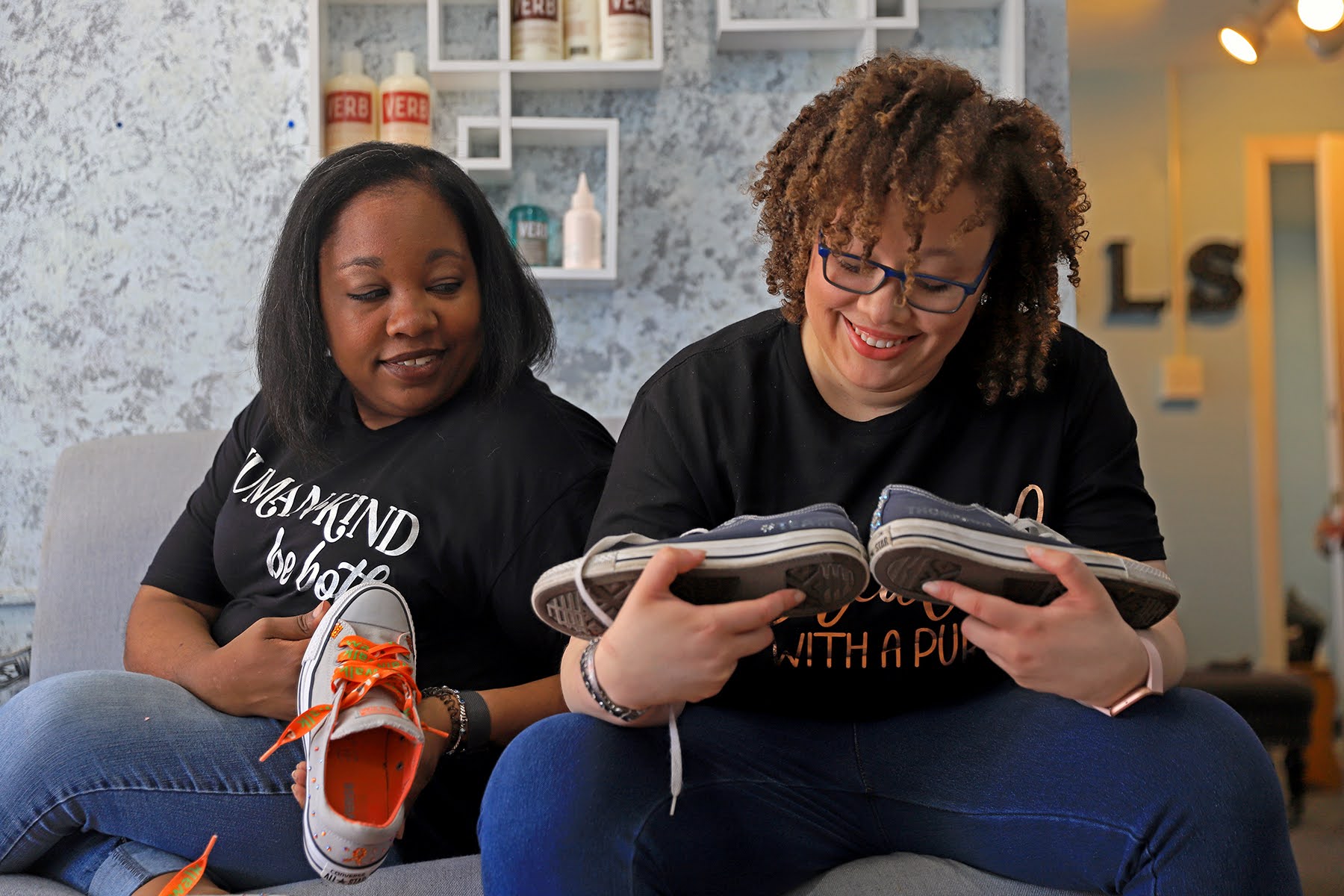Jennifer Szweda Jordan (00:02):
Only one in three African-Americans who needs mental health care receives it. That's according to the American Psychiatric Association. It may be part of the reason it took two decades for Darah Thompson to be diagnosed with, and treated for, mental illness. She is African-American with Native American ancestry.
Jennifer Szweda Jordan (00:24):
Her sister, Alana Gibbs, had a very different experience with disability. Alana was suddenly and quickly diagnosed with multiple sclerosis. The sisters recently sat in Alana's beauty salon and shared their stories. This is the final episode of ADA At 30: Accessibility in Pittsburgh. I'm Jennifer Szweda Jordan with Unabridged Press. This podcast is produced in collaboration with PublicSource. I do have a trigger warning. This conversation contains references to self-harm and being harmed by others.
From just ‘something in my eye’ to a life-changing diagnosis
Darah Thompson (01:01):
I'm Darah Thompson and I'm here with my sister, Alana. Do you want to tell us a little bit about yourself? I know you, but the world doesn't.
Alana Gibbs (01:08):
I am a mom of a boy. And I have two four-legged babies. I'm a manicurist and a salon owner of a full-service salon.
Darah Thompson (01:23):
Tell the world about when you got diagnosed.
Alana Gibbs (01:26):
We had been on a road trip. We were cleaning out your storage unit, so in my mind, I thought I got something in my eye. So I wasn't too concerned, took some ibuprofen and thought nothing of it until the next day, I started losing the vision in my eye. You said, "You should probably go to Med Express." So I did, and from there they said, "We can't help you. We got to send you to the E.R." Went to the E.R. And that's when life as I knew it changed.
Alana Gibbs (02:01):
I had optic neuritis, which is inflammation of the optic nerve, which is one of the first symptoms of multiple sclerosis. And hearing multiple sclerosis was like a punch in the gut because I had heard of it but I didn't know about it. So when I started doing research I thought, "Oh, my goodness. Am I going to be in a wheelchair? Am I going to have the ability to use my arms? Am I going to be able to see again?" Multiple sclerosis is different for everybody so they weren't able to answer my specific questions.
Darah Thompson (02:42):
How's your vision now?
Alana Gibbs (02:43):
My vision is not completely restored but it's much better than it was. So optic neuritis is like if you got hit in the eye with a baseball, very painful. You feel pain when you move your eye. And when it started, I just had a little, tiny black spot in my eye that started to get larger. Your other eye then tries to adjust, which then causes headaches and things like that. So it was scary to me because I have loss of color in my left eye. So doing my job, it's difficult, because it's all about color. So it's a little frustrating.

Alana Gibbs, pictured at the Bridgeville salon she owns, has multiple sclerosis. (Photo by Jay Manning/PublicSource)
Maintaining high-end manicure work, and questioning God
Alana Gibbs (03:34):
I believe I have done nine, 10 seasons at Fashion Week. I was just in New York this past February for Fashion Week. And we were trying a different technique. We had doubled the amount of models that we normally do. And usually it's a team of about 15 to 18 people. There was only six of us. It was hot, it was cramped. When I get overheated, my symptoms start to kick in. And I want to do a good job for my team, that's why I'm there. And I could feel it. I could feel the tingle starting. I could feel my head starting to swim a little bit. But I got some water, a little bit of chocolate and I got my job done. But it was hard because I don't know how much longer I can put my body through that.
Darah Thompson (04:37):
How has your relationship with God changed since your diagnosis? Or has it changed?
Alana Gibbs (04:46):
That's a huge one. When they couldn't get the inflammation to stop, I had to go and spend 10 days in the hospital. They wanted to do plasma freezes. Which that's the cleaning of the plasma to take out anything bad or whatever could possibly be causing the inflammation. So sitting in the hospital, I had to have a tube put into my neck. I wasn't going anywhere. And I felt like this was God saying, "You work too much, slow down. You didn't want to slow down on your own, so here we are."
Alana Gibbs (05:27):
And I prayed a lot. And was like, "Hey, why am I here? What do you want from me?" And I felt like God was just saying, "You, I want you." And so since then, I've lived not necessarily differently but more aware, aware of what I was doing, what I was saying, what I was putting out in the world. And I feel like things have been much better.
Darah Thompson (06:07):
Do you feel like you are maybe on God's plan now, when before maybe you were on the road beside-
Alana Gibbs (06:16):
On the Alana plan?
Darah Thompson (06:16):
Yes, you're on your plan.
Alana Gibbs (06:19):
Yeah, because I'm the glue that holds my household together and I had to give that up. So Darah, what about you?
Darah Thompson (06:35):
So, I am a serial entrepreneur. I use my disability to empower my entrepreneurship. I have a health and wellness business that I started back in 2012 when I realized it was hard to find employment when you have a disability. And I am currently working on opening an online bakery, because the challenges that I have are not just for me. Lots of other people also have these challenges, so I would like to employ people with disabilities.
Darah Thompson (07:07):
I was diagnosed with bipolar disorder when I was 26, 27, somewhere around there. So it was a journey getting to that diagnosis. First, they thought I might have autism. And then they thought I had PTSD and ADHD. And then I had severe depression and PTSD. I wasn't doing well. I was talking to my dog and I thought my dog was talking back. I was drinking and not working. It was a mess.
Darah Thompson (07:45):
So when we talked about religion for you, my mom was like, "You got to go to church. You go to church, I don't care what you do throughout the rest of the week, you're going to church on Sunday." So I started going to church on Sunday. The day I showered was Sunday. And Pastor Rick and his wife were just instrumental. They were open and welcoming, and loving.
Alana Gibbs (08:09):
So let me just say, a lot of times when it comes to church people, even though they go to church, and even though biblically you're not supposed to judge, sometimes church people are the most judgmental, unfortunately.
Darah Thompson (08:25):
When I tried to get help from the church when I was in Chicago they told me, "That's not something that's wrong with Black people. You just need Jesus."
Alana Gibbs (08:34):
"Just pray about it more, it'll be OK."
Darah Thompson (08:37):
Yeah.
Alana Gibbs (08:37):
"You're just a little sad."

Sisters Alana Gibbs (left) and Darah Thompson discuss in this podcast how their entrepreneurship is affected by their different disabilities. (Photo by Jay Manning/PublicSource)
From unhelpful theology to a loving pastor
Darah Thompson (08:39):
Well Pastor Rick, I wrote him this long email and I said, "When I was a kid, I was sexually assaulted. It went on for a while. As an adult, I've been raped. I've self-harmed, I've wanted to kill myself, I've tried to kill myself." And he said, "Why don't you come and talk to me and my wife?" And from there on, I knew I was going to be OK. And he told me, "You're going to be OK. You're going to get better."
Darah Thompson (09:10):
And just their love and comfort, I truly believed it. So I worked with them and they got me to a point where I was stable. And they said, "All right, do you trust us? Will you go see someone else that we believe?" And that's what truly put me on a healthier trajectory, having true people that loved you and believed in me. Granted, it wasn't just smooth sailing. Mental illness, unfortunately, is cyclical. So sometimes I'm super and it's awesome. And other times, it's not.
Alana Gibbs (09:49):
What have you learned most about yourself since you have been diagnosed and all these different changes and life events, and things, have happened?
Learning you’re not alone
Darah Thompson (10:01):
Well, this is going to sound weird. But I've learned that I'm not special. Lots of people have been molested as kids. Lots of people self-harm. Lots of people are bipolar. So all those secrets I felt like I had to keep because I felt like I was special but in a bad way, I don't have to. I can actually use those to help connect with people. I used to work with the county and go into schools and talk to kids.
Darah Thompson (10:29):
So the first day I'd tell them all about what mental illness is and the definition of it. And then the second day, after lunch I'd tell them my story. And so many kids would relate. I have stacks of notes from kids that are like, "Oh, thank you. I think I'm going to take meds." "Oh, I'm going to talk to somebody." "Oh, I think my mom needs to talk to somebody." That when we realize that the things that we think we need to hide, we don't. So I think that's what I've really learned, and to stand up for myself more.
Alana Gibbs (11:09):
Yeah. I think you do that very well.
Darah Thompson (11:11):
Yeah.
Alana Gibbs (11:11):
I think you're the bulldog in our relationship.
Darah Thompson (11:18):
I am. I'm the shy one, but I'm also the one that you're definitely not going to push around.
Alana Gibbs (11:23):
Right. Yeah, even though, I'm always like, "I'm going to call my sister."
Darah Thompson (11:28):
Yeah.
Alana Gibbs (11:29):
Yes.
Jennifer Szweda Jordan (11:34):
Again, that was Alana Gibbs and Darah Thompson. This podcast, ADA at 30: Accessibility in Pittsburgh explores more personal stories like these. I hope you'll listen to all five episodes, where you can also hear how people who use wheelchairs rate sidewalks and restaurant access in Pittsburgh and other communities. Speaking of ratings, don't forget to rate this podcast. And when you're done listening, hop over to adapittsburgh.com. There are moving, first-person essays about disability. And you'll find reporting about access to voting booths as well as houses of worship.
Jennifer Szweda Jordan (12:11):
This work is produced in collaboration with PublicSource. I'm Jennifer Szweda Jordan, with Unabridged Press. Kara Holsopple edited and designed sound on this episode. Thanks for listening.